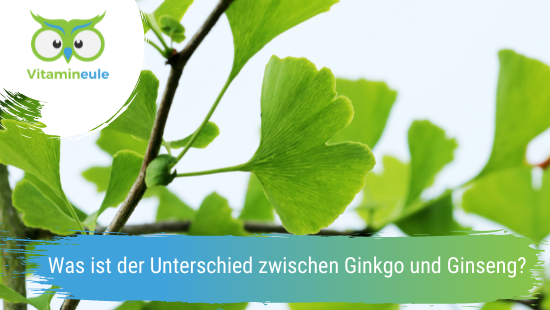

Team Vitamineule
Questions, wishes or suggestions? Just contact us by email or on Facebook.
1. what is the difference between ginkgo and ginseng?
Ginseng is a plant species from the Aralia family. In Far Eastern medicine, it is taken as a tonic for fatigue and exhaustion. It is also used for potency problems and as a blood thinner. One differentiates between the red and white Ginseng.
Ginkgo is one of the oldest trees in the world. The ginkgo tree is very hardy and can grow up to 40 meters high. It comes from China and is also called Ginkgo Biloba. In Asia it is very famous because of its edible seeds and positive properties. For this reason, ginkgo is one of the most intensively studied medicinal plants.
2. how high is the daily requirement of Ginkgo?
The intake of ginkgo promotes concentration and leads to an increase in memory. It is possible to take ginkgo in the form of capsules, tablets and drops. Recommended is the intake of 120 mg ginkgo per day. Thus Ginkgo can develop its property best. An increase of the dose should always be discussed with a physician.
3. which side effects can occur with the admission of Ginkgo?
As a rule, the intake of Ginkgo is very well tolerated. In very rare cases, headaches or gastrointestinal complaints may occur. Anyone taking anticoagulant medication should always discuss the intake of ginkgo with a physician. The supplementation of Ginkgo can strengthen the effect of blood clotting. Anyone who is due to have an operation in the near future should stop taking ginkgo beforehand. Ginkgo in much too high doses can have cell-damaging effects.
4. ginkgo in the form of food auxiliary means
Who would like to take Ginkgo Biloba in form of food auxiliary means, should absolutely pay attention to the form of the active substance and its origin. Ginkgo capsules in particular are excellent for increasing the value. They are very well tolerated and are utilized by the body to a high degree. Likewise, the preparation should not contain any chemical additives such as microcrystalline cellulose. If you buy a preparation from Germany, you can be sure that the product has also been produced safely and is of high quality.
Our recommendation:
Vitamineule® Ginkgo Capsules
In our online store you will find our Ginkgo Capsules from Vitamineule®, which are completely free of artificial additives. Vitamineule® Ginkgo Capsules contain 120 mg of pure Ginkgo Biloba extract per capsule. Each tin contains 90 capsules. In addition to fast & free shipping, we offer a voluntary six-month return guarantee on all products.
5. conclusion: what is the difference between ginkgo and ginseng?
Many people wonder what is the difference between ginkgo and ginseng. Ginseng is a plant, ginkgo is a tree. The root of the ginseng plant is processed for various purposes, while ginkgo requires the leaves. However, both ginkgo and ginseng provide more motivation and act against listlessness.
Ginkgo is commercially available in the form of capsules and tablets. Both forms are easy to handle and enter the circulation quickly. When taking supplements, always stick to the recommended daily amount and always discuss changes with a doctor.
Further reading:
- Ginkgo biloba for the treatment of tinnitus.
- Efficacy and adverse effects of ginkgo biloba for cognitive impairment and dementia: a systematic review and meta-analysis.
- Ginkgo Biloba for Mild Cognitive Impairment and Alzheimer's Disease: A Systematic Review and Meta-Analysis of Randomized Controlled Trials
- Ginseng and Ginkgo Biloba Effects on Cognition as Modulated by Cardiovascular Reactivity: A Randomised Trial
Disclaimer and General Medical Notice: The content presented in our health blog is for neutral information and general education purposes only. It does not constitute a recommendation or advertisement of any diagnostic method, treatment or drug described or mentioned. The text does not claim to be complete, nor can the timeliness, accuracy and balance of the information presented be guaranteed. The text is in no way a substitute for professional advice from a physician or pharmacist, and it should not be used as a basis for independent diagnosis and initiation, modification, or termination of treatment of any disease. Always consult your trusted physician for any health questions or complaints. Mach Dich Wach! GmbH and the authors assume no liability for any inconvenience or damage resulting from the use of the information presented here. 5-Hydroxytryptophan (5-HTP): Natural Occurrence, Analysis, Biosynthesis, Biotechnology, Physiology and Toxicology

